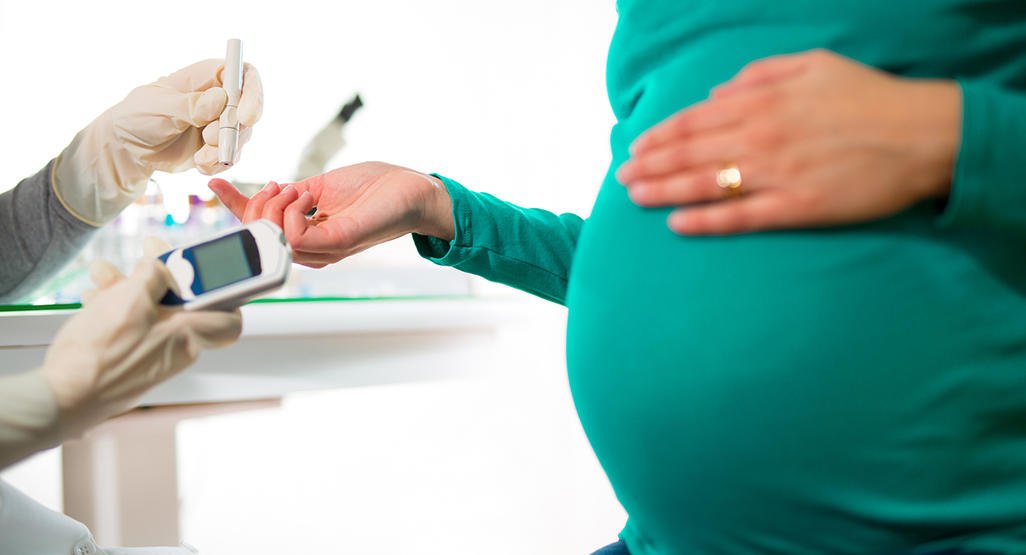See A Registered Dietitian Nutritionist
If you dont already see a dietitian, you should start seeing one before you get pregnant. Your dietitian can help you learn what to eat, how much to eat, and when to eat to reach or stay at a healthy weight before you get pregnant. Together, you and your dietitian will create a meal plan to fit your needs, schedule, food preferences, medical conditions, medicines, and physical activity routine.
During pregnancy, some women need to make changes in their meal plan, such as adding extra calories, protein, and other nutrients. You will need to see your dietitian every few months during pregnancy as your dietary needs change.
How Can I Prevent Or Delay Type 2 Diabetes Later In Life
You can do a lot to prevent or delay type 2 diabetes by making these lifestyle changes:
- Reach and stay at a healthy weight. Try to reach your prepregnancy weight 6 to 12 months after your baby is born. Then, if you still weigh too much, work to lose at least 5 to 7 percent of your body weight and keep it off. For example, if you weigh 200 pounds, losing 10 to 14 pounds can greatly reduce your chance of getting diabetes.
- Be physically active for at least 30 minutes most days of the week.
- Follow a healthy eating plan. Eat more grains, fruits, and vegetables. Cut down on fat and calories. Your health care team can help you design a meal plan.
- Ask your doctor if you should take the diabetes medicine metformin. Metformin can lower your chances of having type 2 diabetes, especially if you are younger and heavier and have prediabetes or if you have had gestational diabetes.
These changes can help you enjoy a longer, healthier life. Your health care team can give you information and support to help you make these changes.
Talk with your doctor if you are thinking about having another baby. For the safety of your baby, your blood glucose needs to be at healthy levels before you get pregnant again. Your doctor can help ensure you are ready for your next child.
If You Have Gestational Diabetes How Can You Help Prevent Getting Diabetes Later In Life
For most women, gestational diabetes goes away after giving birth. But having it makes you more likely to develop type 2 diabetes later in life. Type 2 diabetes is the most common kind of diabetes. If you have type 2 diabetes, your pancreas makes too little insulin or your body becomes resistant to it .
Heres what you can do to help reduce your risk of developing type 2 diabetes after pregnancy:
- Breastfeed. Breastfeeding can help you lose weight after pregnancy. Being overweight makes you more likely to develop type 2 diabetes.
- Get tested for diabetes 4 to 12 weeks after your baby is born. If the test is normal, get tested again every 1 to 3 years.
- Get to and stay at a healthy weight.
- Talk to your provider about medicine that may help prevent type 2 diabetes.
You May Like: Peer Reviewed Articles On Diabetes Mellitus
What Happens To My Baby While I Am Pregnant
Ever hear of the old saying, you are what you eat? The saying holds true in gestational diabetes because the foods you eat that are high in sugar not only affect your blood sugar levels but also your baby.
Babies born to moms with uncontrolled high blood sugar levels are more prone to store that sugar as fat, leading to a larger baby at birth which can create difficulties during delivery.
In Alberta, having gestational diabetes doubles your chance of having a larger baby so it is important to follow the nutritional and medical guidance of your health care team.
Causes And Risk Factors Of Gestational Diabetes

Similar to type 2 diabetes, gestational diabetes develops when the body is no longer able to respond effectively to insulin a condition called insulin resistance.
When the body’s cells don’t properly absorb glucose, the simple sugar builds up in the bloodstream, resulting in elevated levels of glucose on blood tests.
Gestational diabetes is caused by the effects of placental hormones, says Kevin Borst, DO, an endocrinologist at Cleveland Clinic in Ohio. These can increase insulin resistance in susceptible individuals. It is not fully understood why some women dont tolerate these hormones well and ultimately develop gestational diabetes.
These hormones include:
- Human placental lactogen
- Placental insulinase
What’s more, other changes during pregnancy such as eating more, exercising less, and having larger fat deposits can contribute to insulin resistance.
- Prediabetes
- Previously having an unexplained stillbirth or miscarriage
Still, some women without any of these risk factors may go on to develop gestational diabetes due to their intolerance of the placental hormones, Dr. Borst explains.
Recommended Reading: How Long Do Type 1 Diabetics Live
How Can I Prevent Gestational Diabetes
There are no guarantees when it comes to prevention, but the more healthy habits you can adopt before pregnancy, the better. If youve had gestational diabetes, these healthy choices may also reduce your risk of having it again in future pregnancies or developing type 2 diabetes in the future.
- Eat healthy foods Choose foods high in fiber and low in fat and calories. Focus on fruits, vegetables and whole grains. Strive for variety to help you achieve your goals without compromising taste or nutrition. Watch portion sizes.
- Keep active exercising before and during pregnancy can help protect you from developing gestational diabetes. Aim for 30 minutes of moderate activity on most days of the week. Take a brisk daily walk. Ride your bike. Swim laps. Short bursts of activity such as parking further away from the store when you run errands or taking a short walk break all add up too.
- Start pregnancy at a healthy weight if youre planning to get pregnant, losing extra weight beforehand may help you have a healthier pregnancy. Focus on making lasting changes to your eating habits that can help you through pregnancy, such as eating more vegetables and fruits.
- Dont gain more weight than recommended gaining some weight during pregnancy is normal and healthy. But gaining too much weight too quickly can up your risk of gestational diabetes. Ask your doctor what a reasonable amount of weight gain is for you.
How Can I Help My Child Be Healthy In The Future
You can help your child be healthy by showing your child how to make healthy lifestyle choices, including being physically active, limiting screen time in front of the TV or video games, eating a healthy diet, and staying at a healthy weight.
More information about Managing Diabetes is provided in the NIDDK health topics:
You May Like: Low A1c Symptoms
Target Blood Glucose Levels During Pregnancy
Recommended daily target blood glucose numbers for most pregnant women with diabetes are
- Before meals, at bedtime, and overnight: 90 or less
- 1 hour after eating: 130 to 140 or less
- 2 hours after eating: 120 or less3
Ask your doctor what targets are right for you. If you have type 1 diabetes, your targets may be higher so you dont develop low blood glucose, also called hypoglycemia.
Will Your Baby Need Special Care After Birth
Your baby may need special care after birth. This is because your baby is at risk of having low sugar levels soon after birth, and thus he may have to undergo blood glucose testing. In case the results are abnormal, your doctor will be monitoring your baby closely.
Your doctor may recommend feeding your baby soon after birth to prevent low blood sugar levels. However, in extreme cases, the doctor may recommend intravenous glucose to get your babys blood sugar levels under control.
Depending on how the labour and delivery went, the doctor may keep your baby in a neonatal intensive care unit for some time to take special care of your baby under the following conditions:
- Your baby is born prematurely.
- Your baby has breathing difficulty.
- Your baby has low blood sugar or hypoglycaemia.
- Your baby has other common birth-related complications such as jaundice.
Don’t Miss: How Much Does Metformin Lower A1c
Who’s At Risk Of Gestational Diabetes
Any woman can develop gestational diabetes during pregnancy, but you’re at an increased risk if:
- your body mass index is above 30 use the BMI healthy weight calculator to work out your BMI
- you previously had a baby who weighed 4.5kg or more at birth
- you had gestational diabetes in a previous pregnancy
- 1 of your parents or siblings has diabetes
- you are of south Asian, Black, African-Caribbean or Middle Eastern origin
If any of these apply to you, you should be offered screening for gestational diabetes during your pregnancy.
Monitoring Your Blood Glucose Levels
Your medical team will give you a target range for your blood glucose levels. You will need to check these at home while you are pregnant.
You can purchase a blood glucose measuring kit from your local pharmacy or diabetes centre, or from Diabetes Australia in your state or territory call 1800 637 700 for help.
To test your blood glucose levels, you prick your finger with a lancet and put a small drop of blood onto a testing strip. Then you insert the strip into a meter, which reads your blood glucose level.
Read Also: What Are Normal A1c Levels For Non Diabetic
How Else Might Gestational Diabetes Affect My Pregnancy
You may have more frequent ultrasounds to monitor your babys growth. Your doctor may do a nonstress test to make sure your babys heart rate increases when they are active.
Your doctor may also recommend induction if labor doesnt start by your due date. This is because postdate delivery can increase your risks when you have gestational diabetes.
How Will I Know If I Have It

You can expect your doctor to assess your risk for GDM at your first prenatal visit.
If you are at high risk, you’ll have a blood test for GDM as soon as possible. If your test is negative, you’ll repeat the test about week 24-28.
If you are not at high risk, you should also get screened about week 24-28.
To test for gestational diabetes, your doctor may order a test known as the glucose challenge test. You do not need to fast for this. If you fail the test, you will have an oral glucose tolerance test. You will fast for a certain period beforehand . This two-step approach is commonly used.
After you’re diagnosed, your doctor or midwife will want to watch your health and your baby’s health closely for the rest of your pregnancy.
You May Like: Is Pita Bread Ok For Diabetics
How Does Gestational Diabetes Affect Me And My Baby
With proper treatment and regular monitoring by your practitioner, gestational diabetes can be managed and is not harmful to you or your baby. But if GDM is not treated, and excessive sugar circulates in a mother’s blood and the baby’s, the potential problems for both mother and baby are serious.
Women who have uncontrolled GDM are at risk for having a too-large baby , making delivery more difficult and C-section more likely. They are also at risk for preeclampsia and stillbirth.
And because gestational diabetes is considered a pregnancy complication, pregnant women who have it may be more likely to be induced, since most doctors won’t let their pregnancies progress past their due dates.
Uncontrolled diabetes could also lead to potential problems for the baby after birth, such as jaundice, breathing difficulties and low blood sugar levels. Later in life, baby may be at an increased risk for obesity and type 2 diabetes.
But keep in mind, these potential negative effects don’t apply to moms who follow their doctors’ recommendations to keep their blood sugar under control.
Short Term Effects For The Baby
Short term effects include:
Each of these effects is possible in non gestational diabetes pregnancies as well, but the risk is higher in gestational diabetic pregnancies.
You May Like: Can Metformin Cause Joint Pain
Gestational Diabetes And Pregnancy
Gestational diabetes is a type of diabetes that is first seen in a pregnant woman who did not have diabetes before she was pregnant. Some women have more than one pregnancy affected by gestational diabetes. Gestational diabetes usually shows up in the middle of pregnancy. Doctors most often test for it between 24 and 28 weeks of pregnancy.
Often gestational diabetes can be controlled through eating healthy foods and regular exercise. Sometimes a woman with gestational diabetes must also take insulin.
How Can Gestational Diabetes Affect Me
If you have gestational diabetes, you are more likely to develop preeclampsia, which is when you develop high blood pressure and too much protein in your urine during the second half of pregnancy.
Preeclampsia can cause serious or life-threatening problems for you and your baby. The only cure for preeclampsia is to give birth. If you have preeclampsia and have reached 37 weeks of pregnancy, your doctor may want to deliver your baby early. Before 37 weeks, you and your doctor may consider other options to help your baby develop as much as possible before he or she is born. Learn more about preeclampsia.
Gestational diabetes may increase your chance of having a cesarean section, also called a C-section, because your baby may be large. A C-section is major surgery.
If you have gestational diabetes, you are more likely to develop type 2 diabetes later in life. Over time, having too much glucose in your blood can cause health problems such as diabetic retinopathy, heart disease, kidney disease, and nerve damage. You can take steps to help prevent or delay type 2 diabetes.
Recommended Reading: Baked Sweet Potatoes For Diabetics
Questions To Ask Your Doctor
- Im pregnant. Am I at risk for gestational diabetes?
- Is screening for gestational diabetes a standard part of my prenatal care?
- What tests do I need?
- Does gestational diabetes put my baby at risk for any health problems?
- Can I control gestational diabetes through lifestyle changes alone?
- What changes should I make to my diet and exercise?
- Will I need insulin? For how long?
- What follow-up tests or care will I need after I deliver my baby?
Will My Baby Have Diabetes
Research shows that most babies won’t have diabetes after birth, but they may be somewhat more likely to get type 2 diabetes as adults.
Read the full article.
- Get immediate access, anytime, anywhere.
- Choose a single article, issue, or full-access subscription.
- Earn up to 6 CME credits per issue.
Also Check: Side Affects Of Metformin
What Is The Outlook For Gestational Diabetes
Gestational diabetes usually goes away on its own after you give birth. Your doctor will test your blood sugar levels 6 to 12 weeks after you give birth to make sure your levels are back to normal. If they havent, you may have type 2 diabetes.
Even if your blood sugar is back to normal after your baby arrives, gestational diabetes puts you at an increased risk for developing type 2 diabetes later in life. You should get tested every 3 years to make sure your blood glucose levels are normal.
If you had gestational diabetes, your baby is also at higher risk of becoming overweight or developing type 2 diabetes when theyre older. You can decrease this risk by:
- teaching your child healthy eating habits from a young age
- encouraging your child to be physically active throughout their life
How Is Gestational Diabetes Managed

If you are diagnosed with gestational diabetes, its important to follow your doctors advice. Managing the condition and keeping your blood glucose levels under control helps avoid complications for both you and your baby.
You may be referred to an obstetrician and dietitian and may need more frequent antenatal appointments and regular monitoring of your blood sugar levels.
You May Like: Diabetic Rash On Stomach
Why Is Exercise Important
Your doctor will suggest that you exercise regularly at a level that is safe for you and the baby. Exercise will help keep your blood sugar level normal. It can also make you feel better. Walking is usually the easiest type of exercise when you are pregnant. But swimming or other exercises you enjoy are also beneficial during this time. Ask your doctor to recommend some activities that would be safe for you.
If youre not used to exercising, begin by exercising for 5 or 10 minutes every day. As you get stronger, you can increase your exercise time to 30 minutes or more per session. The longer you exercise and the more often you exercise, the more in control you will be of your blood sugar.
You do need to be careful about how you exercise. Dont exercise too hard or get too hot while exercising. Ask your doctor what activities are safe for you. Depending on your age, your pulse shouldnt go higher than 140 to 160 beats per minute during exercise. If you become dizzy or have back pain or other pain while exercising, stop exercising immediately and call your doctor. If you have uterine contractions , vaginal bleeding, or your water breaks, call your doctor right away.

